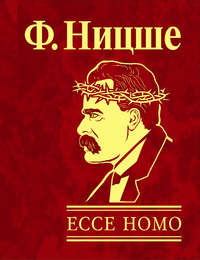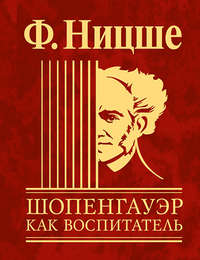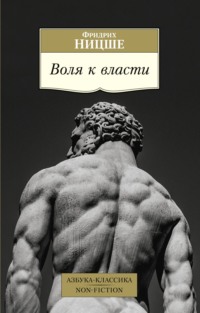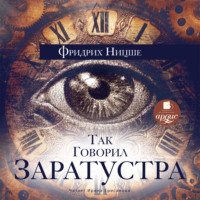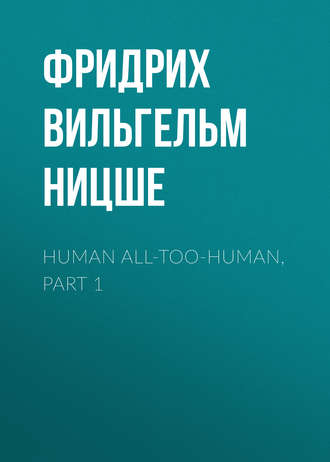 полная версия
полная версияHuman All-Too-Human, Part 1
Wealth As the Origin of a Nobility of Race. – Wealth necessarily creates an aristocracy of race, for it permits the choice of the most beautiful women and the engagement of the best teachers; it allows a man cleanliness, time for physical exercises, and, above all, immunity from dulling physical labour. So far it provides all the conditions for making man, after a few generations, move and even act nobly and handsomely: greater freedom of character and absence of niggardliness, of wretchedly petty matters, and of abasement before bread-givers. It is precisely these negative qualities which are the most profitable birthday gift, that of happiness, for the young man; a person who is quite poor usually comes to grief through nobility of disposition, he does not get on, and acquires nothing, his race is not capable of living. In this connection, however, it must be remembered that wealth produces almost the same effects whether one have three hundred or thirty thousand thalers a year; there is no further essential progression of the favourable conditions afterwards. But to have less, to beg in boyhood and to abase one's self is terrible, although it may be the proper starting-point for such as seek their happiness in the splendour of courts, in subordination to the mighty, and influential, or for such as wish to be heads of the Church. (It teaches how to slink crouching into the underground passages to favour.)
480Envy and Inertia in Different Courses. – The two opposing parties, the socialist and the national, – or whatever they may be called in the different countries of Europe, – are worthy of each other; envy and laziness are the motive powers in each of them. In the one camp they desire to work as little as possible with their hands, in the other as little as possible with their heads; in the latter they hate and envy prominent, self-evolving individuals, who do not willingly allow themselves to be drawn up in rank and file for the purpose of a collective effect; in the former they hate and envy the better social caste, which is more favourably circumstanced outwardly, whose peculiar mission, the production of the highest blessings of culture, makes life inwardly all the harder and more painful. Certainly, if it be possible to make the spirit of the collective effect the spirit of the higher classes of society, the socialist crowds are quite right, when they also seek outward equalisation between themselves and these classes, since they are certainly internally equalised with one another already in head and heart. Live as higher men, and always do the deeds of higher culture, – thus everything that lives will acknowledge your right, and the order of society, whose summit ye are, will be safe from every evil glance and attack!
481High Politics and Their Detriments. – Just as a nation does not suffer the greatest losses that war and readiness for war involve through the expenses of the war, or the stoppage of trade and traffic, or through the maintenance of a standing army, – however great these losses may now be, when eight European States expend yearly the sum of five milliards of marks thereon, – but owing to the fact that year after year its ablest, strongest, and most industrious men are withdrawn in extraordinary numbers from their proper occupations and callings to be turned into soldiers: in the same way, a nation that sets about practising high politics and securing a decisive voice among the great Powers does not suffer its greatest losses where they are usually supposed to be. In fact, from this time onward it constantly sacrifices a number of its most conspicuous talents upon the "Altar of the Fatherland" or of national ambition, whilst formerly other spheres of activity were open to those talents which are now swallowed up by politics. But apart from these public hecatombs, and in reality much more horrible, there is a drama which is constantly being performed simultaneously in a hundred thousand acts; every able, industrious, intellectually striving man of a nation that thus covets political laurels, is swayed by this covetousness, and no longer belongs entirely to himself alone as he did formerly; the new daily questions and cares of the public welfare devour a daily tribute of the intellectual and emotional capital of every citizen; the sum of all these sacrifices and losses of, individual energy and labour is so enormous, that the political growth of a nation almost necessarily entails an intellectual impoverishment and lassitude, a diminished capacity for the performance of works that require great concentration and specialisation. The question may finally be asked: "Does it then pay, all this bloom and magnificence of the total (which indeed only manifests itself as the fear of the new Colossus in other nations, and as the compulsory favouring by them of national trade and commerce) when all the nobler, finer, and more intellectual plants and products, in which its soil was hitherto so rich, must be sacrificed to this coarse and opalescent flower of the nation?"18
482Repeated Once More. – Public opinion – private laziness.
NINTH DIVISION
MAN ALONE BY HIMSELF
483The Enemies of Truth. – Convictions are more dangerous enemies of truth than lies.
484A Topsy-turvy World. – We criticise a thinker more severely when he puts an unpleasant statement before us; and yet it would be more reasonable to do so when we find his statement pleasant.
485Decided Character. – A man far oftener appears to have a decided character from persistently following his temperament than from persistently following his principles.
486The One Thing Needful. – One thing a man must have: either a naturally light disposition or a disposition lightened by art and knowledge.
487The Passion For Things. – Whoever sets his passion on things (sciences, arts, the common weal, the interests of culture) withdraws much fervour from his passion for persons (even when they are the representatives of those things; as statesmen, philosophers, and artists are the representatives of their creations).
488Calmness in Action. – As a cascade in its descent becomes more deliberate and suspended, so the great man of action usually acts with more calmness than his strong passions previous to action would lead one to expect.
489Not Too Deep. – Persons who grasp a matter in all its depth seldom remain permanently true to it. They have just brought the depth up into the light, and there is always much evil to be seen there.
490The Illusion of Idealists. – All idealists imagine that the cause which they serve is essentially better than all other causes, and will not believe that if their cause is really to flourish it requires precisely the same evil-smelling manure which all other human undertakings have need of.
491Self-observation. – Man is exceedingly well protected from himself and guarded against his self-exploring and self-besieging; as a rule he can perceive nothing of himself but his outworks. The actual fortress is inaccessible, and even invisible, to him, unless friends and enemies become traitors and lead him inside by secret paths.
492The Right Calling. – Men can seldom hold on to a calling unless they believe or persuade themselves that it is really more important than any other. Women are the same with their lovers.
493Nobility of Disposition. – Nobility of disposition consists largely in good-nature and absence of distrust, and therefore contains precisely that upon which money-grabbing and successful men take a pleasure in walking with superiority and scorn.
494Goal and Path. – Many are obstinate with regard to the once-chosen path, few with regard to the goal.
495The Offensiveness in an Individual Way of Life. – All specially individual lines of conduct excite irritation against him who adopts them; people feel themselves reduced to the level of commonplace creatures by the extraordinary treatment he bestows on himself.
496The Privilege of Greatness. – It is the privilege of greatness to confer intense happiness with insignificant gifts.
497Unintentionally Noble. – A person behaves with unintentional nobleness when he has accustomed himself to seek naught from others and always to give to them.
498A Condition of Heroism. – When a person wishes to become a hero, the serpent must previously have become a dragon, otherwise he lacks his proper enemy.
499Friends. – Fellowship in joy, and, not sympathy in sorrow, makes people friends.
500Making Use of Ebb and Flow. – For the purpose of knowledge we must know how to make use of the inward current which draws us towards a thing, and also of the current which after a time draws us away from it.
501Joy in Itself. – "Joy in the Thing" people say; but in reality it is joy in itself by means of the thing.
502The Unassuming Man. – He who is unassuming towards persons manifests his presumption all the more with regard to things (town, State, society, time, humanity). That is his revenge.
503Envy and Jealousy. – Envy and jealousy are the pudenda of the human soul. The comparison may perhaps be carried further.
504The Noblest Hypocrite. – It is a very noble hypocrisy not to talk of one's self at all.
505Vexation. – Vexation is a physical disease, which is not by any means cured when its cause is subsequently removed.
506The Champions of Truth. – Truth does not find fewest champions when it is dangerous to speak it, but when it is dull.
507More Troublesome Even Than Enemies. – Persons of whose sympathetic attitude we are not, in all circumstances, convinced, while for some reason or other (gratitude, for instance) we are obliged to maintain the appearance of unqualified sympathy with them, trouble our imagination far more than our enemies do.
508Free Nature. – We are so fond of being out among Nature, because it has no opinions about us.
509Each Superior in One Thing. – In civilised intercourse every one feels himself superior to all others in at least one thing; kindly feelings generally are based thereon, inasmuch as every one can, in certain circumstances, render help, and is therefore entitled to accept help without shame.
510Consolatory Arguments. – In the case of a death we mostly use consolatory arguments not so much to alleviate the grief as to make excuses for feeling so easily consoled.
511Persons Loyal to Their Convictions. – Whoever is very busy retains his general views and opinions almost unchanged. So also does every one who labours in the service of an idea; he will nevermore examine the idea itself, he no longer has any time to do so; indeed, it is against his interests to consider it as still admitting of discussion.
512Morality and Quantity. – The higher morality of one man as compared with that of another, often lies merely in the fact that his aims are quantitively greater. The other, living in a circumscribed sphere, is dragged down by petty occupations.
513"The Life" As the Proceeds of Life. – A man may stretch himself out ever so far with his knowledge; he may seem to himself ever so objective, but eventually he realises nothing therefrom but his own biography.
514Iron Necessity. – Iron necessity is a thing which has been found, in the course of history, to be neither iron nor necessary.
515From Experience. – The unreasonableness of a thing is no argument against its existence, but rather a condition thereof.
516Truth. – Nobody dies nowadays of fatal truths, there are too many antidotes to them.
517A Fundamental Insight. – There is no pre-established harmony between the promotion of truth and the welfare of mankind.
518Man's Lot. – He who thinks most deeply knows that he is always in the wrong, however he may act and decide.
519Truth As Circe. – Error has made animals into men; is truth perhaps capable of making man into an animal again?
520The Danger of Our Culture. – We belong to a period of which the culture is in danger of being destroyed by the appliances of culture.
521Greatness Means Leading the Way. – No stream is large and copious of itself, but becomes great by receiving and leading on so many tributary streams. It is so, also, with all intellectual greatnesses. It is only a question of some one indicating the direction to be followed by so many affluents; not whether he was richly or poorly gifted originally.
522A Feeble Conscience. – People who talk about their importance to mankind have a feeble conscience for common bourgeois rectitude, keeping of contracts, promises, etc.
523Desiring to Be Loved. – The demand to be loved is the greatest of presumptions.
524Contempt For Men. – The most unequivocal sign of contempt for man is to regard everybody merely as a means to one's own ends, or of no account whatever.
525Partisans Through Contradiction. – Whoever has driven men to fury against himself has also gained a party in his favour.
526Forgetting Experiences. – Whoever thinks much and to good purpose easily forgets his own experiences, but not the thoughts which these experiences have called forth.
527Sticking to an Opinion. – One person sticks to an opinion because he takes pride in having acquired it himself, – another sticks to it because he has learnt it with difficulty and is proud of having understood it; both of them, therefore, out of vanity.
528Avoiding the Light. – Good deeds avoid the light just as anxiously as evil deeds; the latter fear that pain will result from publicity (as punishment), the former fear that pleasure will vanish with publicity (the pure pleasure per se, which ceases as soon as satisfaction of vanity is added to it).
529The Length of the Day. – When one has much to put into them, a day has a hundred pockets.
530The Genius of Tyranny. – When an invincible desire to obtain tyrannical power has been awakened in the soul, and constantly keeps up its fervour, even a very mediocre talent (in politicians, artists, etc.) gradually becomes an almost irresistible natural force.
531The Enemy's Life. – He who lives by fighting with an enemy has an interest in the preservation of the enemy's life.19
532More Important. – Unexplained, obscure matters are regarded as more important than explained, clear ones.
533Valuation of Services Rendered. – We estimate services rendered to us according to the value set on them by those who render them, not according to the value they have for us.
534Unhappiness. – The distinction associated with unhappiness (as if it were a sign of stupidity, unambitiousness, or commonplaceness to feel happy) is so great that when any one says to us, "How happy you are!" we usually protest.
535Imagination in Anguish. – When one is afraid of anything, one's imagination plays the part of that evil spirit which springs on one's back just when one has the heaviest load to bear.
536The Value of Insipid Opponents. – We sometimes remain faithful to a cause merely because its opponents never cease to be insipid.
537The Value of a Profession. – A profession makes us thoughtless; that is its greatest blessing. For it is a bulwark behind which we are permitted to withdraw when commonplace doubts and cares assail us.
538Talent. – Many a man's talent appears less than it is, because he has always set himself too heavy tasks.
539Youth. – Youth is an unpleasant period; for then it is not possible or not prudent to be productive in any sense whatsoever.
540Too Great Aims. – Whoever aims publicly at great things and at length perceives secretly that he is too weak to achieve them, has usually also insufficient strength to renounce his aims publicly, and then inevitably becomes a hypocrite.
541In the Current. – Mighty waters sweep many stones and shrubs away with them; mighty spirits many foolish and confused minds.
542The Dangers of Intellectual Emancipation. – In a seriously intended intellectual emancipation a person's mute passions and cravings also hope to find their advantage.
543The Incarnation of the Mind. – When any one thinks much and to good purpose, not only his face but also his body acquires a sage look.
544Seeing Badly and Hearing Badly. – The man who sees little always sees less than there is to see; the man who hears badly always hears something more than there is to hear.
545Self-enjoyment in Vanity. – The vain man does not wish so much to be prominent as to feel himself prominent; he therefore disdains none of the expedients for self-deception and self-out-witting. It is not the opinion of others that he sets his heart on, but his opinion of their opinion
546Exceptionally Vain. – He who is usually self-sufficient becomes exceptionally vain, and keenly alive to fame and praise when he is physically ill. The more he loses himself the more he has to endeavour to regain his position by means of the opinion of others.
547The "Witty." – Those who seek wit do not possess it.
548A Hint to the Heads of Parties. – When one can make people publicly support a cause they have also generally been brought to the point of inwardly declaring themselves in its favour, because they wish to be regarded as consistent.
549Contempt. – Man is more sensitive to the contempt of others than to self-contempt.
550The Tie of Gratitude. – There are servile souls who carry so far their sense of obligation for benefits received that they strangle themselves with the tie of gratitude.
551The Prophet's Knack. – In predicting beforehand the procedure of ordinary individuals, it must be taken for granted that they always make use of the smallest intellectual expenditure in freeing themselves from disagreeable situations.
552Man's Sole Right. – He who swerves from the traditional is a victim of the unusual; he who keeps to the traditional is its slave. The man is ruined in either case.
553Below the Beast. – When a man roars with laughter he surpasses all the animals by his vulgarity.
554Partial Knowledge. – He who speaks a foreign language imperfectly has more enjoyment therein than he who speaks it well. The enjoyment is with the partially initiated.
555Dangerous Helpfulness. – There are people who wish to make human life harder for no other reason than to be able afterwards to offer men their life-alleviating recipes – their Christianity, for example.
556Industriousness and Conscientiousness. – Industriousness and conscientiousness are often antagonists, owing to the fact that industriousness wants to pluck the fruit sour from the tree while conscientiousness wants to let it hang too long, until it falls and is bruised.
557Casting Suspicion. – We endeavour to cast suspicion on persons whom we cannot endure.
558The Conditions Are Lacking. – Many people wait all their lives for the opportunity to be good in their own way.
559Lack of Friends. – Lack of friends leads to the inference that a person is envious or presumptuous. Many a man owes his friends merely to the fortunate circumstance that he has no occasion for envy.
560Danger in Manifoldness. – With one talent more we often stand less firmly than with one less; just as a table stands better on three feet than on four.
561An Exemplar For Others. – Whoever wants to set a good example must add a grain of folly to his virtue; people then imitate their exemplar and at the same time raise themselves above him, a thing they love to do.
562Being a Target. – The bad things others say about us are often not really aimed at us, but are the manifestations of spite or ill-humour occasioned by quite different causes.
563Easily Resigned. – We suffer but little on account of ungratified wishes if we have exercised our imagination in distorting the past.
564In Danger. – One is in greatest danger of being run over when one has just got out of the way of a carriage.
565The Role According to the Voice. – Whoever is obliged to speak louder than he naturally does (say, to a partially deaf person or before a large audience), usually exaggerates what he has to communicate. Many a one becomes a conspirator, malevolent gossip, or intriguer, merely because his voice is best suited for whispering.
566Love and Hatred. – Love and hatred are not blind, but are dazzled by the fire which they carry about with them.
567Advantageously Persecuted. – People who cannot make their merits perfectly obvious to the world endeavour to awaken a strong hostility against themselves. They have then the consolation of thinking that this hostility stands between their merits and the acknowledgment thereof – and that many others think the same thing, which is very advantageous for their recognition.
568Confession. – We forget our fault when we have confessed it to another person, but he does not generally forget it.
569Self-sufficiency. – The Golden Fleece of self-sufficiency is a protection against blows, but not against needle-pricks.
570Shadows in the Flame. – The flame is not so bright to itself as to those whom it illuminates, – so also the wise man.
571Our Own Opinions. – The first opinion that occurs to us when we are suddenly asked about anything is not usually our own, but only the current opinion belonging to our caste, position, or family; our own opinions seldom float on the surface.
572The Origin of Courage. – The ordinary man is as courageous and invulnerable as a hero when he does not see the danger, when he has no eyes for it. Reversely, the hero has his one vulnerable spot upon the back, where he has no eyes.
573The Danger in the Physician. – One must be born for one's physician, otherwise one comes to grief through him.
574Marvellous Vanity. – Whoever has courageously prophesied the weather three times and has been successful in his hits, acquires a certain amount of inward confidence in his prophetic gift. We give credence to the marvellous and irrational when it flatters our self-esteem.
575A Profession. – A profession is the backbone of life.
576The Danger of Personal Influence. – Whoever feels that he exercises a great inward influence over another person must give him a perfectly free rein, must, in fact, welcome and even induce occasional opposition, otherwise he will inevitably make an enemy.
577Recognition of the Heir. – Whoever has founded something great in an unselfish spirit is careful to rear heirs for his work. It is the sign of a tyrannical and ignoble nature to see opponents in all possible heirs, and to live in a state of self-defence against them.
578Partial Knowledge. – Partial knowledge is more triumphant than complete knowledge; it takes things to be simpler than they are, and so makes its theory more popular and convincing.
579Unsuitable For a Party-man. – Whoever thinks much is unsuitable for a party-man; his thinking leads him too quickly beyond the party.
580A Bad Memory. – The advantage of a bad memory is that one enjoys several times the same good things for the first time.
581Self-affliction. – Want of consideration is often the sign of a discordant inner nature, which craves for stupefaction.
582Martyrs. – The disciples of a martyr suffer more than the martyr.
583Arrears of Vanity. – The vanity of many people who have no occasion to be vain is the inveterate habit, still surviving from the time when people had no right to the belief in themselves and only begged it in small sums from others.
584Punctum Saliens of Passion. – A person falling into a rage or into a violent passion of love reaches a point when the soul is full like a hogshead, but nevertheless a drop of water has still to be added, the good will for the passion (which is also generally called the evil will). This item only is necessary, and then the hogshead overflows.
585A Gloomy Thought. – It is with men as with the charcoal fires in the forest. It is only when young men have cooled down and have got charred, like these piles, that they become useful. As long as they fume and smoke they are perhaps more interesting, but they are useless and too often uncomfortable. Humanity ruthlessly uses every individual as material for the heating of its great machines; but what then is the purpose of the machines, when all individuals (that is, the human race) are useful only to maintain them? Machines that are ends in themselves: is that the umana commedia?
586The Hour-hand of Life. – Life consists of rare single moments of the greatest importance, and of countless intervals during which, at best, the phantoms of those moments hover around us. Love, the Spring, every fine melody, the mountains, the moon, the sea – all speak but once fully to the heart, if, indeed, they ever do quite attain to speech. For many people have not those moments at all, and are themselves intervals and pauses in the symphony of actual life.



